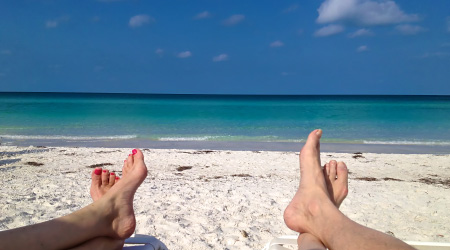How To Budget For A Yearly Vacation

A yearly family vacation can be a very stressful time. Not only do you have to worry about where you're going to stay and how you're going to get there but you must also consider how much it is going to cost for everyone to enjoy themselves. There are some relatively easy steps that can be taken in order to make budgeting for the yearly vacation a simple process.
First and foremost, the best thing to do when planning your vacation is to get started early. A lot of locations including hotels and resorts get booked six to twelve months ahead of time so if you really want to go to Disney World then you need to plan in advance. Even with advance planning, some places get booked early so it is always good to have a backup plan for another location you and the family might enjoy. In a worst-case scenario, even places which are available may charge a premium price if you book to close to the vacation date.
When traveling anywhere, especially out of country, the Internet will become your best friend. Not only is there a plethora of information available online but many forums and message boards will include travel experiences from other families which can provide valuable insight to additional expenses or unexpected inconveniences. International flights and hotel stays may have additional travel expenses that you're not familiar with when traveling in the United States including additional fees or taxes. The key to avoiding nasty surprises is to be well informed by asking lots of questions and doing extensive research ahead of time.
Airlines and other travel services tend to cost more the further the destination often impose baggage limitations as well as maximum weight requirements. You might want to play golf at a resort in Thailand but instead of taking your clubs it may be better to leave them at home and rent some nice clubs when you get to your destination. In fact, travelers to foreign destinations usually purchase numerous additional items so it's best to travel as light as possible initially to provide room for bringing gifts and presents back on your return trip.
Getting to your destination is only half the battle because lodging and food can be more expensive than what it took to arrive at your destination. Most travel related services will include bundle packages for airline tickets as well as reservations to cut down on overall expenses. Making reservations in advance can also eliminate unexpected last-minute scrambling to find a place to stay once you arrive at your destination. If you arrive at a summer hotspot without having reservations it can be quite expensive since you will be competing with other tourists for limited lodging space. As far as locations go, it isn't always necessary to stay at the heart of the tourist district and you might actually find significant savings if you stay slightly outside the main tourist area and off the beaten path. Off-season and off week traveling, while not as flexible for many individuals, can also lead to significant savings because you will be staying in resorts and flying on airlines when most vacationers are still at work.
A final, but of course necessary, expense is that of food. Just as it is at home when not on vacation, eating out can become quite expensive especially if it's three meals a day for seven days. While it is nice to treat yourself by eating unique cuisine in an interesting location, if you're looking to budget and stretch your dollar then it benefits everyone to pick hotels or timeshares which include a small kitchen area. This type of arrangement isn't for slaving over a stove and preparing meals for the whole family but more so for those occasions when you want a sandwich or a couple of bowls of cereal for the kids. This type of planning will provide more financial resources available for eating out at restaurants without having to pinch pennies. Locals often have the best information for getting the most bang for your buck at quality establishments which helps avoid money sink tourist traps.
The keys to budgeting for a yearly vacation are planning early, getting bundled packages for travel and hotel stays and staying at accommodations which allow you to prepare some meals without having to pay tourist prices. It is easy to take simple steps and stretch your dollar so you can still do everything you want to like seeing various tourist attractions and eating out without having the stress about how much money you're spending and whether or not you'll be able to pay for the trip after you return home. Yearly vacations should be fun and stress-free and by taking a few steps everyone can enjoy themselves without worrying about breaking the bank.







